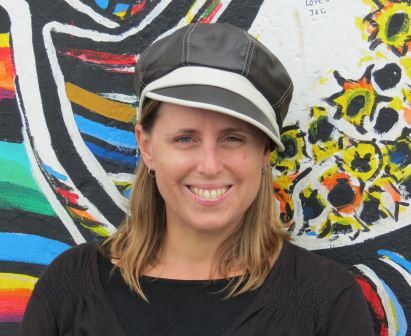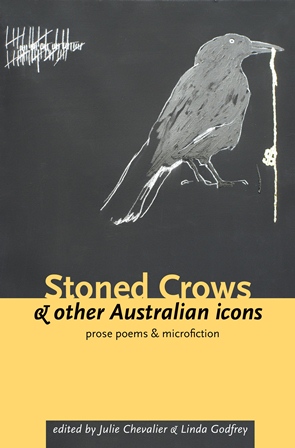 1. What inspired you to write the prose poem/microfiction which is published in Stoned Crows & other Australian icons?
1. What inspired you to write the prose poem/microfiction which is published in Stoned Crows & other Australian icons?
The Swarm started out as a very different story. I got to the end and realised it didn’t say anything interesting at all. I reflected on advice I’d been given by the wonderful writers in my writers’ group which was that I should try writing a male character once in a while. I instantly knew what my ending was and why this story mattered. I then became positively zealous about telling a story that was relateable and compassionate and hopefully not all that surprising, when you stop and think.
2. Tell us about your process. (Do you start sparse and widen out, or do you write down every possible association and cut back? Do you research the subject matter you are writing about? Is it pure intuition?) Take us through an example if you want.
My writing is always sparse, and then I try to make it sparser. My aim is always to take out any word that doesn’t serve a critical purpose. In short fiction there is no room for word-bludgers. Every word must count and I take no prisoners! I once had a mentor, Ashley Mallet, who had been trained as a journalist before going on to write many, many books. Ashley’s training in journalism made him expert at making all the words count. He told me once to ditch 30% of a story – this story only had 1800 words! It was terrifying to attempt to do this, but I did it and in the end I had a much better piece of writing – it was liberating! It feels like you are panning for gold, skimming off the dirt and leaving the shiny bits. Now I always look at what I can take out, rather than what I can add in.
3. What advice do you have for other writers ? about the first or last line? About how to choose the title? Do you follow any rules?
I don’t really feel qualified to offer advice to other writers. I feel like I’m on the cusp of my own writing career and it’s too early for me to have any kind of pride about my own skills.
However, I am pedantic about my last line. In short fiction the last line must feel like an ending (ie satisfying) without telling the reader what happened. It’s a very tough job to write a last line that does this, but it’s always worth trying because the story’s success inevitably hinges on it.
4. Who or what inspires your writing?
Right now I’m inspired by writers who are brave with form. Ryan O’Neill is a wonderful example of this. He is capable of writing a story without even a hint of the language of fiction. He uses pie charts and doodles and chronologies and text book exercises, and somehow manages to create a complete story with emotion and character development and all those other things we expect from stories.
In this digital era I think it’s never been more important to think about new ways to tell stories. As Jack Kerouac said, “The artist must discover new artforms or he will perish”. I believe this to be true and I’m interested in finding new ways of telling stories that don’t just rely on what Ted Nelson calls the “prison of the page”.
5. Tell us what you do if you haven’t written anything in a while and you want to get started writing again? Could you share your favourite writing exercise with our readers?
I allow myself to write complete crap. I tell myself that no one else will ever read this and I can erase it all forever and ever with a simple click of the delete button. I also tell myself that it doesn’t matter what my mother or father or husband or anyone will think. I hold my nerve and try to write with honesty, unafraid of the judgment of anyone. And then I remind myself of what Anaïs Nin said: “The role of the writer is not to say what we all can say, but what we are unable to say.” This gives me the freedom required to write.
And then I log out of Facebook, Twitter, email and the blogosphere. And I write.
